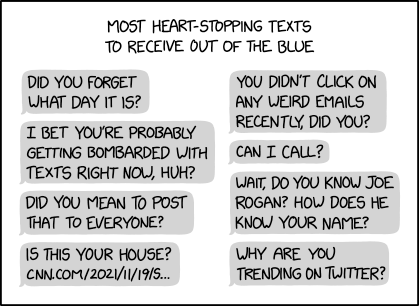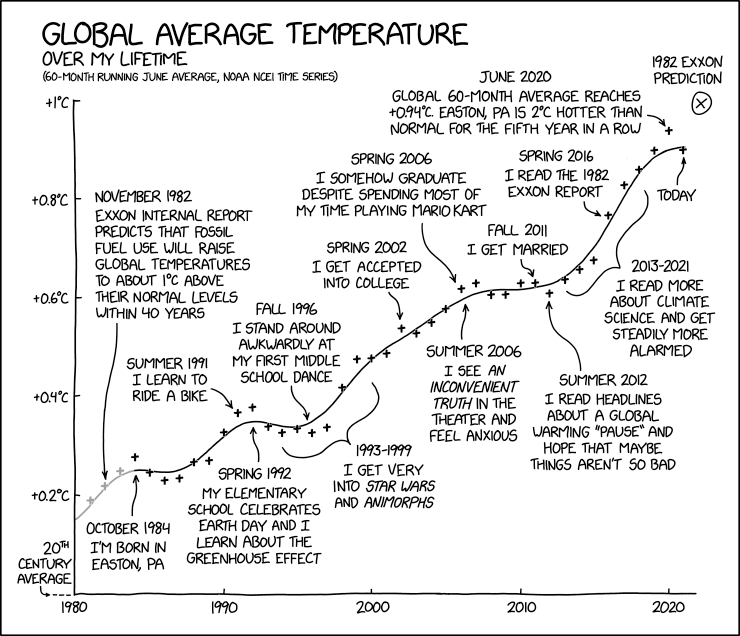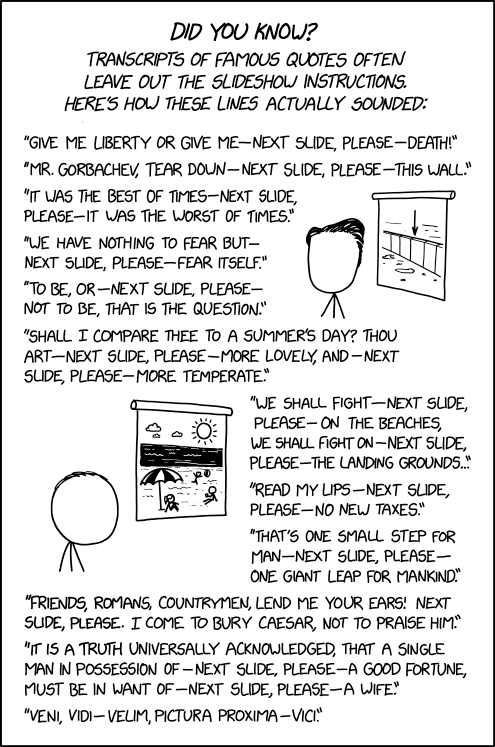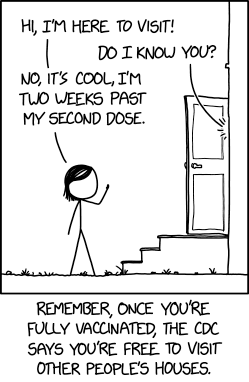I am not a huge fan of memoirs, especially memoirs that detail someone's sad experiences with a religious cult or particularly harrowing circumstances, but for some reason Tara Westover's
Educated caught my eye. Maybe pickings were slim on the New Books shelf.
I have a minor addiction to advice columns and to the 'Am I the Asshole' threads on Reddit. I tell the S.O. that one nice thing about reading them is our own family starts looking pretty damn sane. Well, Educated had kind of the same effect, except in mega doses. Some holy-shit-I-survived memoirs feature a person's escape from a religious cult, some
highlight abusive parents, some feature mental illness, and some involve
abuse by other family members. Westover's book checks all the boxes. It was like, holy wah, this woman needs to stop thinking about someday reconnecting with her incredibly toxic family. Don't fantasize about building a bridge back home; dynamite that sucker in your mind and never look back.
I could see missing your family if you've become estranged because you no longer buy into your father's lunatic right wing conspiracy theories, but not when your parents ignored the fact you were being terribly physically abused by an older sibling and resorted to major gaslighting when you asked why they never intervened. Then when you toss in being treated like slave labor -- what type of deranged adult pressures a 12-year old into operating an industrial metal shear in the family salvage yard? -- and having real, physical life-threatening injuries treated with homeopathic remedies. . . Westover's book is a really nice illustration of how if a totally toxic environment is the only thing you've ever known no sane, safe place is ever going to feel normal.
It probably didn't help Westover psychologically when it wasn't so much that she deliberately cut off ties with her family as it was that they disowned her. She achieved something where most parents would be doing the happy dance and bragging to the whole world about their genius daughter, but not Westover's. To her specific set of demented parents she became a sinner, possessed by a demon, and for sure a slut and a whore when she decided to go to graduate school in England after graduating from Brigham Young University. Her parents had tolerated her attending BYU as long as they believed she just wanted to study music so she could come home, get married, have kids, and give piano lessons on the side. But winning a competitive scholarship, the equivalent of a Rhodes, and then getting more education than any woman needed? Not something they could condone.
Westover's life story is definitely a strange one. She was the youngest of seven children born to a Mormon couple in Idaho. Her family apparently started off as a typical lower middle class household. Her parents met while her mother was still in high school and then got married after her father completed his two-year Mormon missionary obligation. He worked as a contractor, built up his business, and built a house on his parents' farm. They were observant but not fanatics. The oldest three kids started off attending public school. In short, nothing at all odd about the family that would make them much different than any of their neighbors. At some point, though, Westover's father slid into weirdness.
Mormons have always promoted clean living (no stimulants like caffeine), being prepared for disasters, and emphasizing modesty in women, but most aren't fanatics about it. They may not drink Diet Coke themselves but they usually don't freak out and assume you're heading straight to Hell for sipping soft drinks. Similarly, they may have a pantry stocked with a year's supply of food, but they're not obsessed to the point of being doomsday preppers. It's just something they do, kind of like Lutherans internalizing making bland jello salads for church suppers or Catholics looking forward to Friday fish fries during Lent. Westover's parents, on the other hand. . . the family may have continued attending regular church services in town and visited a bit with various relatives, but by the time she was born her father had turned their household into a one-family cult.
Westover speculates that her father suffered from being bipolar, a condition she learned about while in college. It's possible, I suppose, but what's a bit odd is that Westover's mother totally bought into enabling the man's delusions. Maybe it made life easier for her, but end result was the parents' behavior put the kids through hell.
Her father became convinced only he knew the true will of God and that his interpretation of the Bible and the Book of Mormon was infallible. At the same time, he started believing the U.S. government was out to get him. The younger kids were all home birthed by a midwife (a highly illegal arrangement at the time; Idaho did not license midwives or condone home births) and their births never registered. It wasn't until one of the older kids needed a birth certificate in order to get a driver's license that the family applied for delayed birth certificates. By then Westover was nine years old. Her mother couldn't remember her birthday and wasn't even sure about what month Westover was born.
No birth certificates meant, of course, no public school. The younger kids were all home schooled, more or less. No real curriculum, no actual lesson plans, and not a whole lot of reading material in the house. At some point Westover realizes her life is probably going to be like her mother's: get married, have kids, take over her mother's roles as a midwife and herbalist. She also realizes she really doesn't want to do that. One of her brother's had managed to escape the family by getting admitted to BYU -- he had learned that the university had a policy of admitting homeschooled students if they scored at least a 28 on the ACT -- and he encouraged her to do the same to study music. Her one clear talent at that time was vocal music.
When she does get to BYU, she describes herself as being totally socially inept as well as totally ignorant about anything outside her very narrow range of experiences. She says, for example, that the first time she ever saw or heard the word "holocaust" was in an art history class during her first week of college classes. Similarly, once she gets to Cambridge, she's still doing the totally socially inept doofus persona.
This is where I actually do have problems with Westover's memoir. It's loaded with contradictions. She claims to have been totally naive about the world in general, but at the same time she took dance classes as a tween (although that stopped once her father realized that the girls danced in typical ballet and/or tap dance class attire (leotards and tutus). The immodesty freaked him out. As a teenager, she got involved with local amateur theater and sang the lead role in "Annie." To escape working in the family salvage yard, she sought out odd jobs in town and worked at a local supermarket. I find it totally believable that her home life was pretty damn weird (not to mention abusive) but it's not like she was being kept locked in a basement. The family had a computer and internet access. They even had cable television -- her father had a particular love for reruns of "The Honeymooners." In short, she had first hand exposure to how average people lived and how they dressed.
This is one of those memoirs that gets touted as being inspiring, proof of the resiliency of the human spirit, because Westover managed to shape a career as a historian despite the handicap of being raised by wolves. I think she discounts the role sheer dumb luck played. At BYU a roommate could tell Westover was struggling psychologically and persuaded her to talk with her bishop. Mormon bishops have tremendous influence over their congregants. They're also as prone to being abusive patriarchal assholes as any other religion. Westover's, however, did not push her into accepting a good, submissive, go home and get barefoot and pregnant future. She got lucky. He encouraged her to apply for scholarships and to dream big.
Similarly, after she was in England at Cambridge and studying for a master's in philosophy, she had another psychological crisis. She sank into major depression and totally neglected her studies. She failed classes. In most realities, she'd have been toast, booted from the program, and generally told to go back to salvaging scrap iron. Instead, her professors told her she had potential and gave her a second chance. People fail out of graduate programs all the time and no one cares. In Westover's case, someone did care and tossed her a lifeline.
Time to wrap this up. Was the book worth reading? It's a toss-up. It was interesting but depressing as hell. I know rural communities are good at turning a blind eye to domestic and child abuse, but I am nonetheless baffled as to why in the 1990s anyone would think it was fine for a girl in her early teens to be working odd jobs instead of being in school. It's pretty clear that everyone in town knew her family so where the hell was CPS? Just how lax are Idaho's laws when it comes to home schooling? Most states at least want to see some documentation that the parents doing the teaching aren't total dolts.
And then there's the issue of the psychotic older brother. The dude bullied all of his siblings, almost killed his much younger sister several times, and the parents just ignored it all or blamed the behavior on the smaller, weaker kids. He had a local reputation for being a prick who picked fights for no reason. The dude pretty obviously belonged in a cell somewhere, but the parents were oblivious.
Back to is it worth reading. . . if you want to read a life story that reads as though no one would buy this as a movie plot line, go for it. Westover can write. I zipped through it pretty quickly. On the other hand, it is one of those books where I'm happy it came from the library and not a bookstore. Spending actual money on it would have felt a bit dirty, like I was subsidizing misery porn.

































